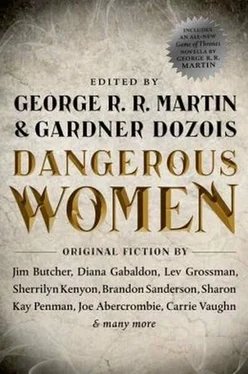The Princess and The Queen,
Or, The Blacks and The Greens
Being A History of the Causes, Origins, Battles, and Betrayals of that Most Tragic Bloodletting Known as the Dance of the Dragons, as set down by Archmaester Gyldayn of the Citadel of Oldtown
(here transcribed by GEORGE R.R. MARTIN)
The Dance of the Dragons is the flowery name bestowed upon the savage internecine struggle for the Iron Throne of Westeros fought between two rival branches of House Targaryen during the years 129 to 131 AC. To characterize the dark, turbulent, bloody doings of this period as a "dance" strikes us as grotesquely inappropriate. No doubt the phrase originated with some singer. "The Dying of the Dragons" would be altogether more fitting, but tradition and time have burned the more poetic usage into the pages of history, so we must dance along with the rest.
There were two principal claimants to the Iron Throne upon the death of King Viserys I Targaryen: his daughter Rhaenyra, the only surviving child of his first marriage, and Aegon, his eldest son by his second wife. Amidst the chaos and carnage brought on by their rivalry, other would-be kings would stake claims as well, strutting about like mummers on a stage for a fortnight or a moon's turn, only to fall as swiftly as they had arisen.
The Dance split the Seven Kingdoms in two, as lords, knights, and smallfolk declared for one side or the other and took up arms against each other. Even House Targaryen itself became divided, when the kith, kin, and children of each of the claimants became embroiled in the fighting. Over the two years of struggle, a terrible toll was taken of the great lords of Westeros, together with their bannermen, knights, and smallfolk. Whilst the dynasty survived, the end of the fighting saw Targaryen power much diminished, and the world's last dragons vastly reduced in number.
The Dance was a war unlike any other ever fought in the long history of the Seven Kingdoms. Though armies marched and met in savage battle, much of the slaughter took place on water, and… especially… in the air, as dragon fought dragon with tooth and claw and flame. It was a war marked by stealth, murder, and betrayal as well, a war fought in shadows and stairwells, council chambers and castle yards, with knives and lies and poison.
Long simmering, the conflict burst into the open on the third day of third moon of 129 AC, when the ailing, bedridden King Viserys I Targaryen closed his eyes for a nap in the Red Keep of King's Landing, and died without waking. His body was discovered by a serving man at the hour of the bat, when it was the king's custom to take a cup of hippocras. The servant ran to inform Queen Alicent, whose apartments were on the floor below the king's.
The manservant delivered his dire tidings directly to the queen, and her alone, without raising a general alarum; the king's death had been anticipated for some time, and Queen Alicent and her party, the so-called greens, had taken care to instruct all of Viserys's guards and servants in what to do when the day came.
Queen Alicent went at once to the king's bedchamber, accompanied by Ser Criston Cole, Lord Commander of the Kingsguard. Once they had confirmed that Viserys was dead, Her Grace ordered his room sealed and placed under guard. The serving man who had found the king's body was taken into custody, to make certain he did not spread the tale. Ser Criston returned to White Sword Tower and sent his brothers of the Kingsguard to summon the members of the king's small council. It was the hour of the owl.
Then as now, the Sworn Brotherhood of the Kingsguard consisted of seven knights, men of proven loyalty and undoubted prowess who had taken solemn oaths to devote their lives to defending the king's person and kin. Only five of the white cloaks were in King's Landing at the time of Viserys's death; Ser Criston himself, Ser Arryk Cargyll, Ser Rickard Thome, Ser Steffon Darklyn, and Ser Willis Fell. Ser Erryk Cargyll (twin to Ser Arryk) and Ser Lorent Marbrand, with Princess Rhaenyra on Dragonstone, remained unaware and uninvolved as their brothers-in-arms went forth into the night to rouse the members of the small council from their beds.
Gathering in the queen's chambers as the body of her lord husband grew cold above were Queen Alicent herself; her father Ser Otto Hightower, Hand of the King; Ser Criston Cole, Lord Commander of the Kingsguard; Grand Maester Orwyle; Lord Lyman Beesbury, master of coin, a man of eighty; Ser Tyland Lannister, master of ships, brother to the Lord of Casterly Rock; Larys Strong, called Larys Clubfoot, Lord of Harrenhal, master of whisperers; and Lord Jasper Wylde, called Ironrod, master of laws.
Grand Maester Orwyle opened the meeting by reviewing the customary tasks and procedures required at the death of a king. He said, "Septon Eustace should be summoned to perform the last rites and pray for the king's soul. A raven must needs be sent to Dragonstone at once to inform Princess Rhaenyra of her father's passing. Mayhaps Her Grace the queen would care to write the message, so as to soften these sad tidings with some words of condolence? The bells are always rung to announce the death of a king, someone should see to that, and of course we must begin to make our preparations for Queen Rhaenyra's coronation—"
Ser Otto Hightower cut him off. "All this must needs wait," he declared, "until the question of succession is settled." As the King's Hand, he was empowered to speak with the king's voice, even to sit the Iron Throne in the king's absence. Viserys had granted him the authority to rule over the Seven Kingdoms, and "until such time as our new king is crowned," that rule would continue.
"Until our new queen is crowned," Lord Beesbury said, in a waspish tone.
"King," insisted Queen Alicent. "The Iron Throne by rights must pass to His Grace's eldest trueborn son."
The discussion that followed lasted nigh unto dawn. Lord Beesbury spoke on behalf of Princess Rhaenyra. The ancient master of coin, who had served King Viserys for his entire reign, and his grandfather Jaehaerys the Old King before him, reminded the council that Rhaenyra was older than her brothers and had more Targaryen blood, that the late king had chosen her as his successor, that he had repeatedly refused to alter the succession despite the pleadings of Queen Alicent and her greens, that hundreds of lords and landed knights had done obeisance to the princess in 105 AC, and sworn solemn oaths to defend her rights.
But these words fell on ears made of stone. Ser Tyland pointed out that many of the lords who had sworn to defend the succession of Princess Rhaenyra were long dead. "It has been twenty-four years," he said. "I myself swore no such oath. I was a child at the time." Ironrod, the master of laws, cited the Great Council of 101 and the Old King's choice of Baelon rather than Rhaenys in 92, then discoursed at length about Aegon the Conquerer and his sisters, and the hallowed Andal tradition wherein the rights of a trueborn son always came before the rights of a mere daughter. Ser Otto reminded them that Rhaenyra's husband was none other than Prince Daemon, and "we all know that one's nature. Make no mistake, should Rhaenyra ever sit the Iron Throne, it will be Daemon who rules us, a king consort as cruel and unforgiving as Maegor ever was. My own head will be the first cut off, I do not doubt, but your queen, my daughter, will soon follow."
Queen Alicent echoed him. "Nor will they spare my children," she declared. "Aegon and his brothers are the king's trueborn sons, with a better claim to the throne than her brood of bastards. Daemon will find some pretext to put them all to death. Even Helaena and her little ones. One of these Strongs put out Aemond's eye, never forget. He was a boy, aye, but the boy is the father to the man, and bastards are monstrous by nature."
Читать дальше












